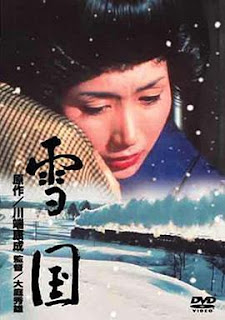23. Che sī chi̍t-pak tōa kôaⁿ ê iā-kéng
Put-jî-kò, yi he tùi to͘-chhī sū-bu̍t ê him-siān, taⁿ í-keng sī choa̍t-bāng, iōng tan-sûn ê hòng-khì kā pau khí-lâi; kóng he sī to͘-chhī sit-pāi-chiá chū-ko ê put-boán, put-jû kóng sī chi̍t-chióng tan-sûn ê bô-chhái kang. Yi ka-tī bô piáu-hiān ai-oàn, m̄-koh chāi Shimamura khòaⁿ, ū chi̍t-chióng kî-miāu ê ai-chhiû. Nā tîm-chùi tī chit-chióng su-khó, Shimamura hoān-sè ē ka-tī hām-lo̍h iâu-oán ê kám-siang, hoâi-gî jîn-seng mā sī chi̍t-chióng bô-chhái kang. M̄-koh, ba̍k-chiu chêng chit-ê cha-bó͘ ê bīn, hō͘ soaⁿ ê khong-khì chìm kah âng kì-kì, súi tang-tang.
Bô-lūn án-nóa, Shimamura chóng-sī tùi yi ū sin ê khòaⁿ-hoat. M̄-koh, tùi-hong í-keng sī chi̍t-ê gē-tòaⁿ, taⁿ soah tian-tò pháiⁿ khui-chhùi ah.
Hit-sî, yi chùi bâng-bâng, khì-náu chhiú-kut bâ-pì, hē-la̍t kā i kā, koh hoah kóng:
"Che sī sáⁿ mi̍h-kiāⁿ! Cheng-seⁿ. Cheng-seⁿ. Lán-si-kut. Lí chit-ê mi̍h-kiāⁿ!"
Yi ê kha khiā bē-chāi, hàiⁿ nn̄g-ē tō poa̍h-tó ah.
"Choa̍t-tùi bô sáⁿ hó khó-sioh lah. M̄-koh, góa m̄-sī hit-khoán cha-bó͘." Siūⁿ-khí chit-kù ōe, Shimamura tiû-tî chi̍t-ē. Cha-bó͘ chin bín-kám, sûi kak-chhat tio̍h, tō khiā khí-lâi. Chit-sî tú-hó thiaⁿ tio̍h hóe-chhia ê chúi-lê siaⁿ, yi kóng: "Pòaⁿ-mê óng Tokyo ê chhia." Āu lâi, yi tōa-la̍t thoah-khui chóa-thang, koh phah-khui po-lê-thang, chē tī thang-á-tâi, hûn-su khò tī thang-á ê hoâiⁿ-koaiⁿ.
Léng khong-khì sûi tō lâu-ji̍p pâng-keng. Hóe-chhia siaⁿ chiām-chiām hūiⁿ khì, thiaⁿ-tio̍h ná iā-hong ê siaⁿ.
"Oeh, bē léng hioh? Sam-pat!"
Simamura mā khiā khí-lâi, kiâⁿ kòe-khì, bô kám-kak ū hong.
Che sī chi̍t-pak tōa kôaⁿ ê iā-kéng, ká-ná ē-tàng thiaⁿ-tio̍h tàng-seh ê siaⁿ hiàng kàu tē-khak ê chhim-té. Bô goe̍h. Gia̍h-thâu khòaⁿ, móa thiⁿ ê chheⁿ, chē kah ná m̄-sī chin ê, iāⁿ-iāⁿ-sih, chhin-chhiūⁿ iōng thài-hi ê sok-tō͘ lak lo̍h-lâi. Chheⁿ-sîn óa-kīn gán-chêng lâi, iā-khong oa̍t-lú tò-thè, iā-sek mā oa̍t-lú chhim. Pian-kài ê soaⁿ í-keng hun bē-chhut chêng-āu, kan-ta sī o͘ khâm-khâm, tāng-hoâiⁿ-hoâiⁿ chhāi tī iā-khong ê kûn-ûi. Che sī chi̍t-phiàn bêng-lóng, an-chēng ê hô-hâi khì-hun.
--
23. 這是一幅大 kôaⁿ ê 夜景
不而過, 她 he 對都市事物 ê 欣羨, 今已經是絕望, 用單純 ê 放棄 kā 包起來; 講彼是都市失敗者自高 ê 不滿, 不如講是一種單純 ê 無彩工. 她家治無表現哀怨, 毋過在 Shimamura 看, 有一種奇妙 ê 哀愁. 若沉醉 tī 這種思考, Shimamura 凡勢會家治陷落遙遠 ê 感 siang, 懷疑人生 mā 是一種無彩工. 毋過, 目睭前這个查某 ê 面, 予山 ê 空氣浸 kah 紅 kì-kì, 媠 tang-tang.
無論 án-nóa, Shimamura 總是對她有新 ê 看法. 毋過, 對方已經是一个藝旦, 今煞顛倒歹開喙 ah.
彼時, 她醉茫茫, 氣惱手骨麻痺, 下力 kā 伊咬, koh 喝講:
"這是啥物件! 精牲. 精牲. 懶屍骨. 你這个物件!"
她 ê 跤徛袂在, 幌兩下 tō 跋倒 ah.
"絕對無啥好可惜 lah. 毋過, 我毋是彼款查某." 想起這句話, Shimamura 躊 tî 一下. 查某真敏感, 隨覺察著, tō 徛起來. 這時拄好聽著火車 ê 水螺聲, 她講: "半暝往 Tokyo ê 車." 後來, 她大力挩開紙窗, koh 拍開玻璃窗, 坐 tī 窗仔台, 魂軀靠 tī 窗仔 ê 橫杆.
冷空氣隨 tō 流入房間. 火車聲漸漸 hūiⁿ 去, 聽著 ná 夜風 ê 聲.
"Oeh, 袂冷 hioh? 三八!"
Simamura mā 徛起來, 行過去, 無感覺有風.
這是一幅大 kôaⁿ ê 夜景, ká-ná 會當聽著凍雪 ê 聲 hiáng 到地殼 ê 深底. 無月. 攑頭看, 滿天 ê 星, 濟 kah ná 毋是真 ê, 焱焱爍, 親像用太虛 ê 速度 lak 落來. 星辰倚近眼前來, 夜空越 lú 倒退, 夜色 mā 越 lú 深. 邊界 ê 山已經分袂出前後, 干焦是烏 khâm-khâm, 重橫橫 chhāi tī 夜空 ê 裙圍. 這是一遍明朗, 安靜 ê 和諧氣氛.
--
23.
But her longing for the city had become an undemanding dream, wrapped in simple resignation, and the note of wasted effort was much stronger in it than any suggestion of the exile's lofty dissatisfaction. She did not seem to find herself especially sad, but in Shimamura's eyes there was something strangely touching about her. Were he to give himself quite up to that consciousness of wasted effort, Shimamura felt, he would be drawn into a remote emotionalism that would make his own life a waste. But before him was the quick, live face of the woman, ruddy from the mountain air.
In any case, he had revised his view of her, and he had found, surprisingly, that her being a geisha made it even more difficult for him to be free and open with her.
Dead-drunk that night, she had savagely bitten her half-paralyzed arm in a fit of irritation at its recalcitrance. "What's the matter with you? Damn you, damn you. Lazy, worthless. What's the matter with you?"
And, unable to stand, she had rolled from side to side. "I'll never have any regrets. But I'm not that sort of woman. I'm not that sort of woman."
"The midnight for Tokyo." The woman seemed to sense his hesitation, and she spoke as if to push it away. At the sound of the train whistle she stood up. Roughly throwing open a paper-paneled door and the window behind it, she sat down on the sill with her body thrown back against the railing. The train moved off into the distance, its echo fading into a sound as of the night wind. Cold air flooded the room.
"Have you lost your mind?" Shimamura too went over to the window. The air was still, without a suggestion of wind.
It was a stern night landscape. The sound of the freezing of snow over the land seemed to roar deep into the earth. There was no moon. The stars, almost too many of them to be true, came forward so brightly that it was as if they were falling with the swiftness of the void. As the stars came nearer, the sky retreated deeper and deeper into the night color. The layers of the Border Range, indistinguishable one from another, cast their heaviness at the skirt of the starry sky in a blackness grave and somber enough to communicate their mass. The whole of the night scene came together in a clear, tranquil harmony.
--


No comments:
Post a Comment